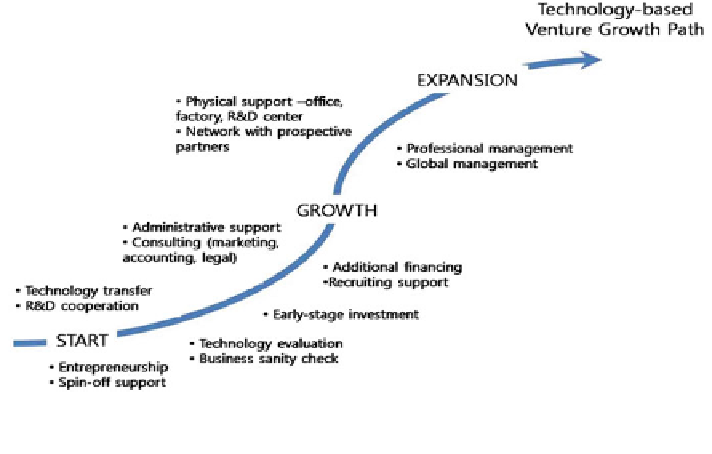Civil Engineering Reference
In-Depth Information
Fig. 1 Technology-based venture growth path, supporting ''entrepreneurship'' of high-tech
venture firms
2.3 Tools and Mechanism: Business Incubator/Technology
Commercialization Center
Business incubator is one of the major instruments for stimulating entrepreneur-
ship and venture business development in the science park. Small BIs are facilities
that support new and small firms by providing affordable space, shared office
services, financial services, and management assistance. According to Allen
(
1985
), the incubator concept must include four dimensions, such as a local net-
work, multitenant space, shared services, and management consulting assistance.
Sponsorship of small BIs falls into five major categories (1) public entities; (2)
nonprofit organization; (3) universities; (4) private corporations; and (5) public
private partnerships (MacDonald
1987
). Differing sponsorship has tended to mean
variation in incubator objectives and administration. Public sector and nonprofit
organization sponsors seek to create jobs, diversify the economy, and expand the
tax base. Universities become involved in incubator sponsorship as a means of
creating a working laboratory for students or to provide a vehicle for marketing the
products of faculty research. This causes them to be a bit more relaxed in their
policies regarding tenant admission. Like publicly sponsored incubators, they are
more likely to establish a time limit for individual tenant occupancy due to a
concern that they might otherwise be seen as providing an inequitable advantage to
private entities. University incubators tend to support high technology-oriented
tenants over other industries (Oh
2002
).
A Technology Commercialization Center is also one of the major instruments for
stimulating entrepreneurship and venture business development in the science park.

Search WWH ::

Custom Search